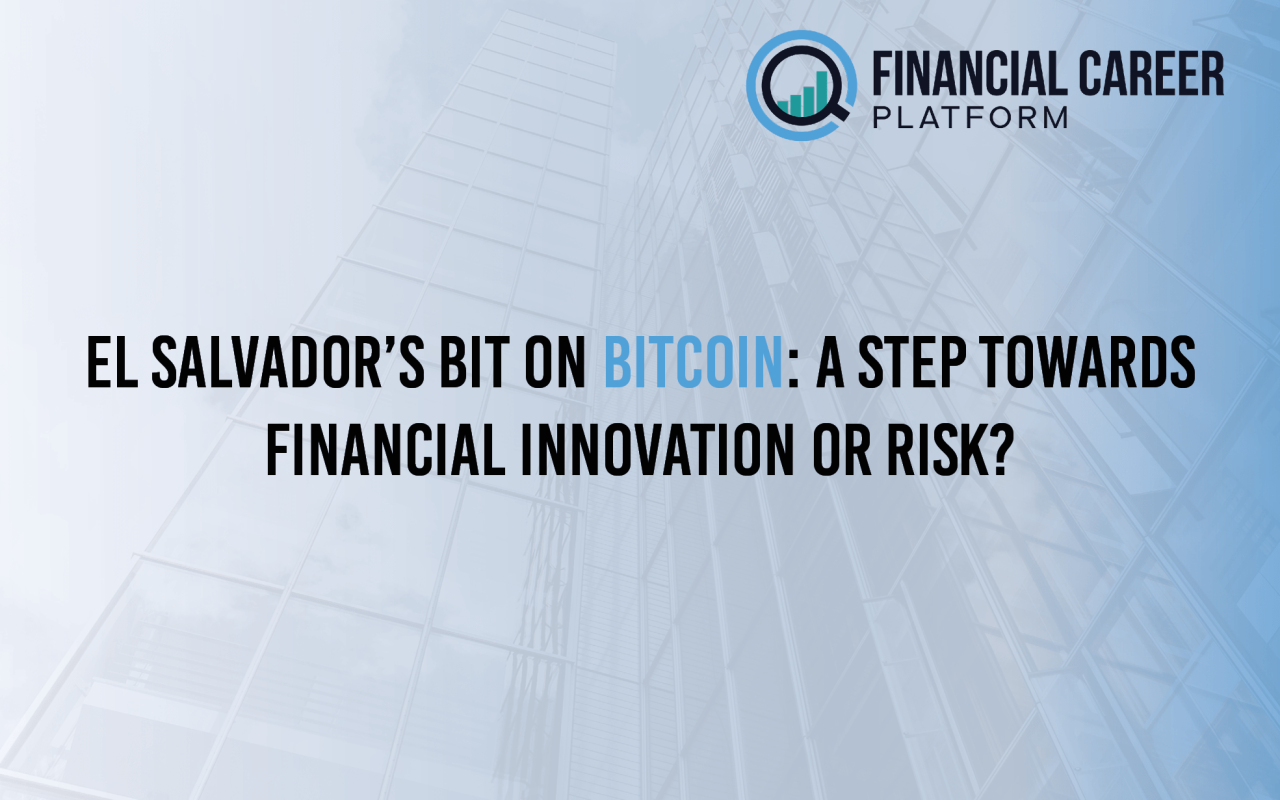El Salvador's Bit on Bitcoin: A Step Towards Financial Innovation or Risk?

El Salvador's Bit on Bitcoin: A Step Towards Financial Innovation or Risk?
Since its introduction in 2008, Bitcoin has challenged traditional notions of value exchange and sparked ongoing debates about its possible role as a currency. Perceived as a decentralized alternative to traditional financial systems, Bitcoin was designed to allow individuals to transact directly with each other, removing the need for intermediaries such as banks. While its promise of financial autonomy and innovation has sparked global attention, concerns about its volatility, scalability, and suitability for everyday use have persisted.
Despite these challenges, El Salvador made history in 2021 by becoming the first country to adopt Bitcoin as legal tender.
Implementation
The Bitcoin Law was passed by the Legislative Assembly of El Salvador on the 8th of June, 2021, and entered into force 90 days after its publication in the Official Gazette. The piece of legislation, comprising 16 Articles, was brought forward by Nayib Bukele, the country’s president. The law, although compact, covers the main aspects that clarify the position of the cryptocurrency for the country’s citizens, from its general functioning as currency to clarification on its adoption.
Article 1 recognizes Bitcoin as legal tender, followed by Article 2, which states that its exchange rate is to remain floating, based on market supply and demand. Articles 3 and 4 focus on the possibility of pricing products in Bitcoin, as well as paying taxes, and Article 5 specifies that, as legal tender, Bitcoin would also not be subject to capital gains taxes.
Certain articles expand on how Bitcoin should be treated by individuals in El Salvador, such as Article 7, which states that individuals are obliged to accept payments in Bitcoin when offered as currency. Article 13 extends on this by stating that debtors also have the possibility of paying off debts using Bitcoin.
The government also included Article 14 to safeguard the country from the obvious fluctuations Bitcoin has been subject to in recent years by creating a trust fund to protect the country from significant exchange fluctuation losses.
Furthermore, to support the implementation of the law, the government also launched the Chivo Wallet, the first official government wallet to allow Salvadoran citizens to easily conduct transactions in both Bitcoin and dollars, with zero commission fees. However, the government has recently decided to stop its use and will proceed to discontinue or sell it following a deal made with the International Monetary Fund (IMF).
Benefits
Although the precise reasoning behind this radical change is subject to speculation, there are many benefits that could have convinced El Salvador to adopt Bitcoin as legal tender. Cryptocurrencies have been embraced worldwide for their financial inclusion, allowing everyone to freely exchange currencies without the need for a bank as an intermediary. This, as a result, also translates into lower fees paid for remittances, which are transfers of money from family or community members who are living abroad, which were previously incurred.
El Salvador is heavily dependent on remittances as they account for up to a quarter of its GDP. Countries who experience high work emigration naturally have a high inflow of remittances, and services like the ones Western Union offers are traditionally popular for such transfers, but incur fees as high as five or six percent. Replacing these high fees with the transaction fees of Bitcoin, which using Chivo Wallet were free but without remain low, is thus a tremendous boost for El Salvador.
Furthermore, while Bitcoin is indeed subject to considerable fluctuations, these go both ways, meaning the country has also signed up for potential (occasional) wealth accumulation through the appreciation of cryptocurrencies. An example of this can be seen in our previous article, where we briefly discussed how the election of a second term for Donald Trump caused Bitcoin to reach an all-time high, with forecasts suggesting further increases.
In addition to this, the country has also benefited from an increase in tourism, attracting people from all over the world, including many crypto enthusiasts eager to visit or even relocate there. Similarly, companies interested in cryptocurrencies, such as Strike, have decided to open new offices in the country.
Challenges & Criticisms
The most notable concern is to the volatility of the price of Bitcoin, while current prices are around 96,000 USD, prices have been as high as 106,000 USD and as low as 39,000 USD this year. This high volatility poses risk to financial stability and consumer protection. For this reasons the IMF has expressed apprehension. It has advised El Salvador to reconsider its Bitcoin adoption due to potential economic instability. With recent price developments being primarily positive El Salvador currently enjoys mainly benefits of the volatility of Bitcoin, but future effects remain uncertain. (Financial Times) In addition there are concerns about the adoption of Bitcoin throughout the population. Many citizens lack access to the necessary technology or don’t have the technological literacy to use Bitcoin effectively. A study finds that only 7.5% of the population uses Bitcoin for transactions, indicating a low adoption rate. (the Times)
Another challenge and point of criticism has been the cost of implementation. The government’s investment in promoting Bitcoin, including the development of the Chivo Wallet and Bitcoin ATMs, has been substantial. Despite these efforts, public skepticism remains high and adoption low, as herefore mentioned, with many preferring to use the U.S. dollar over Bitcoin. (Yaleschool of management insights)
Current status and implications for the future
Currently El Salvador is negotiating a $ 1.3 billion loan deal with the IMF. To secure this deal El Salvador is expected to scale back its Bitcoin dreams. Under the proposed terms, Bitcoin acceptance by businesses would become optional rather than mandatory, and the government’s involvement in Bitcoin-related activities would be reduced. (Financial Times)
Despite these developments, the government remains committed to its Bitcoin policy, with plans to continue purchasing Bitcoin and maintaining it as legal tender. The director of the country’s Bitcoin office indicated that acquisitions might increase, signaling ongoing support for cryptocurrency integration. (Reuters)
The future implications for El Salvador and other countries considering similar paths are complex. While the potential for financial innovation and inclusion exists, challenges related to volatility, infrastructure, and international relations must be carefully managed. El Salvador’s experience serves as a critical case study for nations exploring the integration of cryptocurrency into their economies.
Conclusion
El Salvador became the first country to adopt Bitcoin as legal tender in 2021. With the introduction of its Bitcoin Law it aimed to reduce remittance fees and dependency on the US dollar, as well as promote cryptocurrency innovation and tourism. Due to Bitcoin’s recent price surges, the country has enjoyed substantial wealth accumulation. The volatility of Bitcoin, however, also poses risk for the future. In addition to this the implementation costs were very high, with low adoption by its citizens. El Salvador remains committed to its strategy, but is also cautious of its effect on international relations.
Bibliography
- Coindesk https://www.coindesk.com/business/2023/05/24/bitcoin-payments-firm-strikes-headquarters-to-stay-in-us-despite-new-el-salvador-office.
- Forbes https://www.forbes.com/sites/digital-assets/2023/09/29/santander-security-and-bitcoin-boost-tourism-growth-in-el-salvador/.
- America Economia https://www.americaeconomia.com/en/economy-markets/chivo-el-salvadors-official-bitcoin-wallet-will-stop-working-after-agreement-imf.
- Náñez Alonso, S., Echarte Fernández, M., Sanz-Bas, D., & Pérez-Rico, C. (2024)
- Bitcoin Law https://www.asamblea.gob.sv/sites/default/files/documents/decretos/43DA8049-AA39-4DA8-B892-437B2DD27C1C.pdf.
- Chivo Wallet https://www.chivowallet.com.
- Financial Times https://www.ft.com/content/847cdb57-2d56-4259-ab8e-f95032efa259?utm_source=chatgpt.com.
- The Times https://www.thetimes.co.uk/article/i-went-on-holiday-to-el-salvador-and-spent-only-bitcoin-35t898fk5?utm_source=chatgpt.com.
- Insights https://insights.som.yale.edu/insights/el-salvador-adopted-bitcoin-as-an-official-currency-salvadorans-mostly-shrugged?utm_source=chatgpt.com.
- Reuters https://www.reuters.com/latam/domestico/LYZH3HNNANLFDHY5VW4PJIKQE4-2024-12-19/?utm_source=chatgpt.com.
- CNBC https://www.cnbc.com/amp/2021/09/09/el-salvador-bitcoin-move-could-cost-western-union-400-million-a-year.html.











